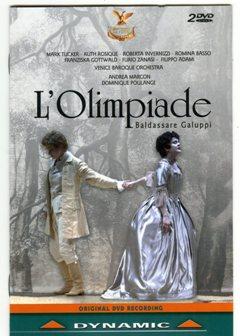Baldassare Galuppi - L'Olimpiade (Marcon) [2006]
Baldassare Galuppi - L'Olimpiade (Marcon) [2006]

Atto I Atto II Atto III Mark Tucker (Clistene) Ruth Rosique (Aristea) Roberta Invernizzi (Argene) Romina Basso (Megacle) Franziska Gottwald (Licida) Furio Zanasi (Alcandro) Filippo Adami (Aminta) Venice Baroque Orchestra Conductor: Andrea Marcon Teatro Malibran – La Fenice, 13 October 2006
Recorded at the Teatro Malibran of La Fenice in Venice as part of the celebrations of the third centenary of Galuppi’s birth, this sumptuous production is the first performance of L’Olimpiade in modern times, and a WORLD PREMIERE RECORDING
Galuppi (1706-1785) was considered the leading exponent of Venetian comic opera, if not its absolute creator, but it was not until recently that his non-comic operas have begun to receive serious attention. One of the lesser known renditions of Pietro Metastasio’s original 1733 libretti, this deeply emotional opera takes place in Olympia during the games and focuses on a love triangle between two best friends Megacle and Licida, and the object of their joint affection, Aristea. The Orchestra Barocca di Venezia, conducted by baroque expert Andrea Marcon, plays on original instruments from the 18th century. --- boosey.com
L'Olimpiade, based on a libretto by Metastasio, was put to music by many composers during the 18th Century; few have been recorded. This now is the version by Baldassare Galuppi - and it is brilliant.
The staging is exquisite; it is neither explicitly traditional nor is it modern. Think about the best Italian design, which despite its simplicity is lavish and elegant. The stage sets are simple. Imagine shades of beige and muted gold, few stylish props and hand-brushed silks. The two female protagonists, Aristea and Argene, look like roaring twenties flappers in sort-of-rococo retro dress; while the two male characters (Megacle sung by Romina Basso, Licida by Franziska Gottwald) look the way I always imagined young Werther. So, the staging actually supports the drama and doesn't distract with the kind of gimmicks that characterise so many Handel performances (Rinaldo being the worst I can think of).
As is the case with Vivaldi operas, there is a fair amount of lengthy recitatives, especially during the exposition. However, they do get shorter (and better) as the story reaches its climax. The conductor sets a brisk pace, so they are not really all that annoying. The story is one of many twists and turns, conflicting loyalties, broken hearts, attempted suicides, etc.... I will probably need to hear it a few times, before it all will make sense. But there is a last minute happy end, the lovers are reunited; and that's what counts.
The arias are magnificent; more in the style of Jommelli than of Vivaldi. Very tender adagio arias contrasted with bravura acts with breakneck coloratura. Especially enjoyable is the scene, in which both women, in consecutive arias, read the riot act to Licida, who appears suitably crest-fallen. All singers in this production deserve praise; there are no weak links.
Andrea Marcon and his Venice Baroque Orchestra provide rich and dramatic orchestral sound. The opera takes about three hours, but one hardly notices. I'm very happy to have this opera and I hope more of Galuppi's serious operas will be recorded. ---Armida, amazon.com
download (mp3 @256 kbs):
uploaded yandex 4shared mega mediafire solidfiles zalivalka cloudmailru oboom








